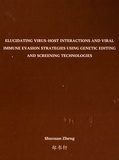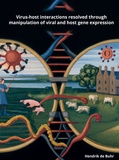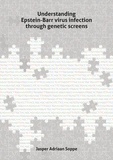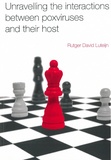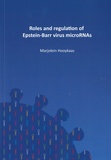Lebbink
The Lebbink lab studies virus-host interactions of Herpesviruses (HSV1, HCMV, EBV) and respiratory viruses (RSV, SARS-CoV-2).
Herpesviruses are large DNA viruses that are carried as a persistent infection by the majority of the population. Herpesvirus-associated pathology is frequently observed in immunosuppressed patients, supporting a crucial role of antiviral immunity in controlling infection. The herpesvirus family includes important human pathogens such as herpes simplex viruses (HSV, causing cold sores and genital herpes), human cytomegalovirus (HCMV, the most common viral cause of congenital defects, and a frequent complication in immuno-compromised individuals), and the Epstein-Barr virus (EBV, causing mononucleosis and associated with ±200.000 new cancer cases each year).
Respiratory viruses are the most frequent causative agents of disease in humans, with significant impact on morbidity and mortality worldwide. Of the many respiratory viruses, RSV and the recent emergence of SARS-CoV-2 are leading causes of respiratory hospitalization in infants and adult respectively. The recent SARS-CoV-2 pandemic illustrates the enormous impact these viruses can have on our society.
The Lebbink lab studies various aspects of the virus-host interaction. We use cutting-edge CRISPR/Cas9 library screen approaches to identify and study host genes involved in virus infection. Additionally, we assess the mechanisms used by these viruses to evade the host immune response targeted to virus-infected cells. Recently, we initiated studies of respiratory viruses in primary airway culture models (air-liquid interphase cultures and organoids) as model system.
Additionally, we develop novel anti-viral strategies based on genome engineering techniques as a potential strategy to prevent herpesvirus infections or limit herpesvirus-associated diseases.
Research interests & topics
Viral immune evasion
Herpesviruses have evolved a wide range of strategies to thwart the immune system. For instance, they interfere with antigen presentation, thereby limiting the anti-virus activity of cytotoxic T cells. Most herpesviruses carry several proteins that simultaneously target multiple steps in the antigen presentation pathway, for example by blocking the transport of peptides into the ER or by promoting the degradation of MHC class I molecules. We dissect how viral proteins are able to block the Transporter associated with antigen processing (TAP), by using a wide range of biochemical, molecular biology and structural approaches (in collaboration with Prof, Friedrich Förster, Faculty of Science, Utrecht University). In addition, we study the human cytomegalovirus evasins US2 and US11 that mediate the degradation of MHC class I molecules via an important cellular quality control process called ERAD (ER-associated protein degradation pathway). Besides viral proteins, we study EBV microRNAs that modulate the immune response by regulating type I interferon signaling and autophagy.
Identification of new host genes involved in herpesvirus infections
Herpesviruses interact extensively with host factors to promote infection and viral replication. We exploit custom genome-wide CRISPR/Cas9 library screens to identify and study human host factors that are critically involved in the primary infection of herpesviruses. Besides obtaining a detailed understanding of the biology of herpesviruses, we hope to bring forward novel candidates for future drug development strategies.
Probing CRISPR-Cas technology as a treatment option for herpesvirus infections
There is no vaccine for HSV-1, although productive HSV-1 infections can be treated with nucleoside analogs such as acyclovir that interfere with virus replication. However, these compounds are ineffective to target the latent virus, nor prevent reactivation from latency. Additionally, HSV-1 can become resistant to these anti-viral drugs. There is a need for alternative strategies to treat, or even cure, HSV-1 infections. In collaboration with the Ophthalmology Department at the UMC Utrecht, we have developed an alternative approach to directly target the viral genome in infected cells using the CRISPR/Cas9 genome editing technique. Current research is focused on studying the potency and limitations of this system and to assess how one can inactivate the latent viral genome, which could potentially lead to cure from infection.
Study RSV and SARS-CoV-2 infection in primary airway culture models
With the onset of the SARS-CoV-2 pandemic, our lab initiated studies on the new coronavirus in our BSL3 lab. In collaboration with Prof. Jeffrey Beekman and Monique Nijhuis, we have set up infection models in primary airway cultures (air-liquid interphase cultures and organoids). Using candidate approach CRISPR/Cas9 cell manipulation, we probe which human genes are involved in virus infection and subsequently study their role in virus infection.

